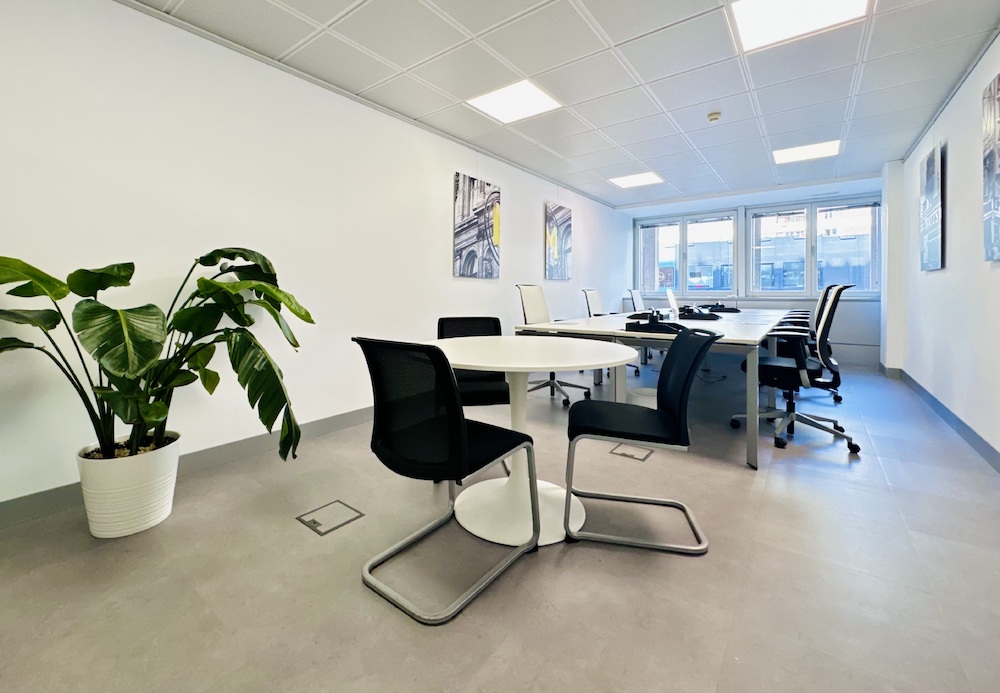Madrid, the beating heart of Spain, is not only known for its rich culture and impressive historical heritage, but also for being the epicentre of business and commerce in the country. Every year, hundreds of companies make the decision to establish their headquarters in this city, seeking to capitalise on its economic dynamism, its vast network of connections and, of course, the prestige that comes with having an address in the Spanish capital.
If you are considering locating your company in Madrid, either for tax reasons or to reflect a solid presence in the Spanish market, you have come to the right place. In the following lines, we will immerse you in the world of company domiciliation in Madrid. We will explore the advantages, procedures and legal nuances that every entrepreneur needs to know before taking this crucial step forward.
The choice to domicile a company is not a decision to be taken lightly. It goes beyond a simple postal address; it is a statement of intent, a way of positioning oneself in the market and, in many cases, a means of taking advantage of tax and legal benefits that can be crucial to a company’s success.
Join us on this informative journey about company domiciliation in Madrid and find out if the Spanish capital is indeed the destination your company has been looking for. We will delve into key aspects such as corporate image, ease of networking and, of course, the regulatory framework surrounding company domiciliation in Madrid. If you are looking to grow your business, this could be the missing piece in your strategy.

What does company domiciliation consist of?
Company domiciliation refers to the process by which a company establishes its official seat or address at a specific location. It is important to note that this address does not necessarily have to coincide with the place where the company carries out its daily operations or activities. In fact, many companies choose to domicile their companies in strategic locations for tax, legal, commercial or image reasons, regardless of where their actual operations are located.
Below, we will break down some key points about company domiciliation in Madrid:
1. Fiscal vs Operational Address:
Fiscal Address: This is the address that a company provides to the tax authorities and uses to receive official communications, notifications and, in general, to comply with tax obligations.
Operational Address: This is the place where the company carries out its daily activities, such as production, administration or the sale of products and services. It does not always coincide with the fiscal address.
- Domiciliation Benefits:
Tax issues: Some regions or countries offer tax advantages or incentives to attract businesses. Domiciling in these areas can result in a lower tax burden.
Image and prestige: Having an address in a recognised location or country can improve the company’s image with customers, suppliers or investors.
Access to services: Some locations offer specialised services for domiciled companies, such as administrative services, meeting rooms, or reception services.
- Domiciliation Process:
To domicile a company, it is necessary to follow a set of formalities which may vary from jurisdiction to jurisdiction. Generally, it involves changing the tax address with the commercial register and other relevant authorities.
It is essential to ensure that all legal aspects are covered and that the company complies with the obligations that come with domiciliation.
- Business Centres and Virtual Domiciliation:
It is common for businesses that do not require a physical space in a specific location to opt for virtual domiciliation. This allows them to have an address in a prestigious location without the need to rent a physical space.
Business centres offer these services, providing a postal address, mail reception services, meeting rooms, among others.
In short, company domiciliation is a strategic tool that allows companies to establish their presence in key locations for various reasons, be they fiscal, image or logistical. It is vital to understand its implications and benefits to make informed decisions that favour the growth and positioning of the company in the market.
How to domicile your company in Madrid?
Incorporating your company in Madrid involves a series of steps and legal considerations. Although the process may seem complex, with proper guidance it can be carried out efficiently and at our flexible office centre in Madrid we are used to performing this service, so here we detail the essential steps to achieve this:
- Determine the type of Domiciliation:
- Tax Domiciliation: If you wish to establish your fiscal address in Madrid for tax purposes.
- Commercial domiciliation: If you only want to have an address in Madrid for correspondence and aspects related to the company’s image, but without changing the fiscal address.
- Find the Ideal Location: Decide whether you need a physical space or whether you prefer to opt for a virtual location through a business centre. Both options have their advantages and depend on the specific needs of your company.
- Documentation and Formalities: Prepare the necessary documentation: public deed of incorporation, CIF, and any other document that accredits the identity and legal representation of the company. If you are going to change the fiscal address, it is necessary to make an amendment to the articles of association.
- Mercantile Register: File the modification of the articles of association with the Mercantile Register of Madrid. This will include a new public deed reflecting the change of address and must be entered in the Register.
- Notification to the Tax Agency: It is essential to inform the Tax Agency about the change of tax domicile. This will affect the filing of taxes and other tax obligations. This is done using form 036 or 037, depending on the nature of the entity.
- Inform Other Bodies and Entities: Do not forget to notify other public bodies, suppliers, banks and any entity with which you have a business or legal relationship about the change of address.
- Check Local Obligations: Each autonomous community and municipality may have specific regulations and obligations. Make sure you are up to date with local tax obligations, licenses and permits in Madrid.
- Review and Adaptation: Review and, if necessary, adapt contracts, invoices, website, business cards and other corporate material to reflect the new address.
- Consider the Bank Domiciliation: If you consider it necessary, you can also change your company’s bank domiciliation to a branch in Madrid. This could facilitate certain operations, although it is not mandatory.
- Maintenance and Monitoring: If you opt for a virtual domiciliation, make sure you keep in regular communication with the business centre so that you are aware of any important correspondence or notifications.
Domiciling your company in Madrid is a strategic decision that, although it involves certain formalities, can provide multiple benefits in terms of tax, business and image. With proper planning, the process can be simple and highly beneficial for your company.
Discovering the advantages of company domiciliation in Madrid
Madrid, the capital of Spain, is much more than just a city with historical and cultural charm; it is one of the main economic arteries of Europe and a reference point for the business world. Domiciling your company in Madrid brings with it a range of advantages that go beyond the obvious. Here are some of the most important reasons for company domiciliation in Madrid:
- Recognition and Prestige: Having an address in Madrid gives the company an air of seriousness and commitment. It is an internationally recognised city, and being associated with it can improve the perception of customers, suppliers and investors.
- Access to Markets: Madrid is a strategic point of connection with the whole of Spain and Europe. Being in the centre of the country, it facilitates logistical operations and allows quick access to different markets.
- Tax Benefits and Aid: The Madrid City Council and the Autonomous Community of Madrid offer, on certain occasions, tax incentives and aid for companies setting up in the region, especially for innovative or growing sectors.
- Business Network: Madrid is home to the headquarters of many large companies and multinationals. Domiciling your company here allows you to be close to potential partners, customers or suppliers, facilitating the creation of strategic alliances.
- First Class Infrastructures: Both in terms of communications and services, Madrid has modern and efficient infrastructures. From the Adolfo Suárez Madrid-Barajas airport, one of the busiest in Europe, to an extensive public transport network, the city is perfectly equipped for business.
- Talent and Training: The city has several highly prestigious universities and training centres. This means that companies based in Madrid have access to a large pool of highly qualified talent.
- International Events and Trade Fairs: Madrid hosts numerous international events, conferences and trade fairs. Being in the city facilitates participation in these events, which can be key to expansion and networking.
- Quality of Life: Although it is not an aspect directly related to business, it is important to consider it. The quality of life in Madrid is high, with a wide range of cultural, gastronomic and leisure activities, which can be an additional attraction for employees and partners.
- Flexibility in Domiciliation Options: There are numerous business centres that offer virtual domiciliation services, allowing companies to enjoy a Madrid address without the need to rent a permanent physical space.
- Innovative and Start-up environment: Madrid has seen a boom in the start-up and entrepreneurship ecosystem. Domiciling your company here puts you in a dynamic and innovative environment, ideal for growing companies or companies with a technological focus.
In conclusion, domiciling your company in Madrid is not just a question of image or prestige, it is a smart strategy that provides multiple benefits. Whether you are looking to expand into the Spanish, European or even global market, Madrid is an option full of opportunities.
Common mistakes when registering companies in Madrid
The domiciliation of companies in Madrid is a process that, although it may seem simple at first glance, has many nuances and details that must be taken into account. Some mistakes can result in legal, fiscal and administrative complications for the company. Here are some of the most common mistakes that companies make when registering companies in Madrid:
- Not Updating All Documents: One of the most common mistakes is forgetting to update all company documents with the new address. This includes not only legal and tax documentation, but also marketing material, contracts with third parties, invoices and business cards.
- Neglecting Tax Obligations: When changing the tax address, tax obligations may change. It is a serious mistake not to be properly informed about the new tax obligations or benefits of the place of domiciliation.
- Failure to Notify Relevant Bodies: Failure to report on time or correctly to entities such as the Tax Agency, the Social Security or the Commercial Registry can result in administrative penalties and complications.
- Virtual Domiciliation without Correspondence Service: If you opt for a virtual domiciliation, it is essential to ensure that the business centre offers an adequate correspondence management service. Failure to do so can lead to the loss of important notifications.
- Not Checking Local Licenses and Permits: Each municipality or autonomous community may have specific regulations. Omitting to review necessary licenses and permits at the new location is a mistake that can have legal consequences.
- Ignorance of local regulations: Not all regions have the same commercial, fiscal or labour regulations. Ignoring the peculiarities of the new location may result in unwanted infringements.
- Failure to Consult an Expert: Company domiciliation is a process with legal and tax implications. Failure to have proper advice from an expert in the field can lead to errors and omissions.
- Deciding on Tax Issues Alone: Although the tax advantages may be an incentive, it is a mistake to domicile the company based solely on this criterion. Logistical, image and operational factors must also be considered.
- Neglecting Corporate Image: If the domiciliation is done for image reasons, it is a mistake not to use it properly. This involves not only changing the address in documents, but also communicating it to customers, suppliers and partners.
- Not Planning for the Long Term: Changing the address of a company should not be an impulsive decision. It is a mistake not to consider the long-term impact and not to adequately plan how it will affect the company’s operations and strategy.
To avoid making these mistakes, it is essential to be properly informed, to plan ahead and to have the support of professional experts in the area. Domiciliation is a strategic decision that, when executed correctly, can offer multiple advantages for the company.
Conclusion on company domiciliation in Madrid
The decision to domicile a company in Madrid is a strategic choice that can have a profound impact on a company’s operations, image and tax structure. Madrid, with its vibrant economic environment, strategic position and international reputation, offers an attractive setting for many companies seeking to optimise their market presence.
However, as we have seen, this process, while full of opportunities, is not without its challenges. It is essential that companies approach domiciliation with a clear understanding of their motivations, expected benefits and the potential obstacles that may arise. Mistakes in domiciliation can be costly, both in terms of resources and corporate image. It is therefore essential to act diligently, to be properly informed and, whenever possible, to be guided by experts in the field.
In short, company domiciliation in Madrid, done correctly and for the right reasons, can be a powerful tool for the growth, consolidation and projection of a company. But, like any strategic tool, it requires careful planning and execution to ensure that its benefits are fully exploited.






